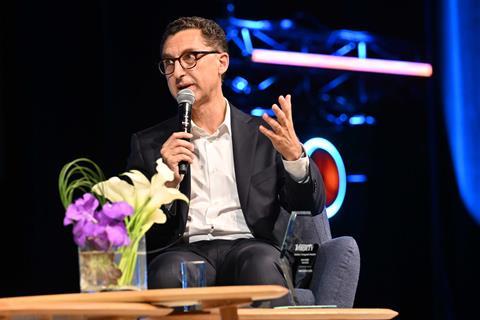
Canal+ Group chairman and CEO Maxime Saada stressed his ambition to grow in-house production arm Studiocanal during a keynote address at Mipcom this week.
Saada said that Canal+ is still too dependent on acquiring third-party content, particularly premium film and sports rights.
He noted that Canal+ Group invests €3.5bn annually on content; of this Studiocanal spends €300m. “So less than 10% really is in-house on the producing side. It is not enough,” said Saada.
“I think one of the big moves going forward is for Studiocanal to grow and to develop its ability and Canal+’s ability to feed into Studiocanal’s potential.”
Saada praised Studiocanal boss Anna Marsh, saying she had ‘really turned it around.” He also stressed that Studiocanal can be pragmatic and flexible about dealmaking.
“Once we do a movie or a show, we can decide if it goes to Netflix, Amazon or Disney+ or Paramount+, or if it goes to Canal+ depending on what we have from the market, really. We’re very open. And I think it’s a good way to run a business.”
Studiocanal currently finances and distributes around 80 feature films and 20 series a year. Its network of production companies includes the UK’s Red Production Company and Spain’s Bambu Productions.
Saada was appointed CEO of Canal+ in 2015 and chairman in 2018 and has grown its subscriber base from 11 million in 2015 to more than 25 million in countries across Europe, Africa and Asia. On his watch, Canal+ has bought stakes in Nordic streamer Viaplay and Asian platform Viu. It also bought European pay-TV broadcaster M7 and is the leading shareholder in South African pay-TV firm Multichoice.
Brink of disaster
Saada was candid about Canal+ recent history, noting that the company “almost died several times - disappeared.”
Soon after Canal+’s launch in 1984, “for a while it was on the brink of disaster,” said Saada. “And then it happened several times over in its history…2000 to 2003, again, Canal+ was on the brink of disaster. And then we had a very difficult time when I was appointed CEO as well.”
He said the company had started to develop what he described as “survivor’s syndrome - should this company exist? Is there is there a sense to us continuing in this environment?”
Saada explained that “a lot of my actions have been driven by my obsession for the company to survive - it’s a very different state of mind than when you’re on the offensive” like a global player such as Netflix.
He said that when he joined, Canal+ was losing a lot of money in its home market of France. “It was a very tough time for Canal+” he recalled. “We had to do some very significant cost reductions, close to 20% of our cost base. We did something that you’d never recommend in a business school, which is to lower the price [of a Canal+ subscription]… to find some growth again. And at the same time, we decided to expand overseas.”
The overseas expansion strategy was executed, he said, because Canal+ was too dependent on the French market.
Turnaround
Among the key moments in Canal+ turnaround, he said, was signing output deals with all the Hollywood studios, and also a significant deal with the French cinema sector for content. He also sought to reduce Canal+ dependency on expensive football domestic football rights.
He cited a deal that integrated Netflix into the Canal+ offer as another significant moment for his company. Saada recalled going to see Netflix co-founder Reed Hastings in Los Gatos five years ago or six years ago: “Reed and I had a very long conversation and I tried to convince him that we were not necessarily competitors, that he was on the same side as Canal+ because he was trying to convince people to actually pay for content. And we started integrating the platforms into our offers - Netflix, and then Disney+, and then Lionsgate+ and then Paramount+ and finally, Apple TV+.”
Saada lavished praise on Netflix. “We owe so much to Netflix – they showed the way, they showed it was possible to have shows and movies travel, to build scale like they did.”
Looking ahead, he said that Africa is a key focus for Studiocanal in particular. “In Africa, we believe there’s millions of stories that have not been told. As soon as you ramp up the production capabilities and the production values, and you give these voices the ability to tell their stories, we really believe there’s a lot of opportunity there. Studiocanal is developing across the world - and Africa will be one of the main territories in the future for Studiocanal well.”






![The Brightest SunScreen[Courtesy HKIFF]](https://d1nslcd7m2225b.cloudfront.net/Pictures/274x183/3/5/0/1448350_thebrightestsunscreencourtesyhkiff_312678.jpg)


















No comments yet